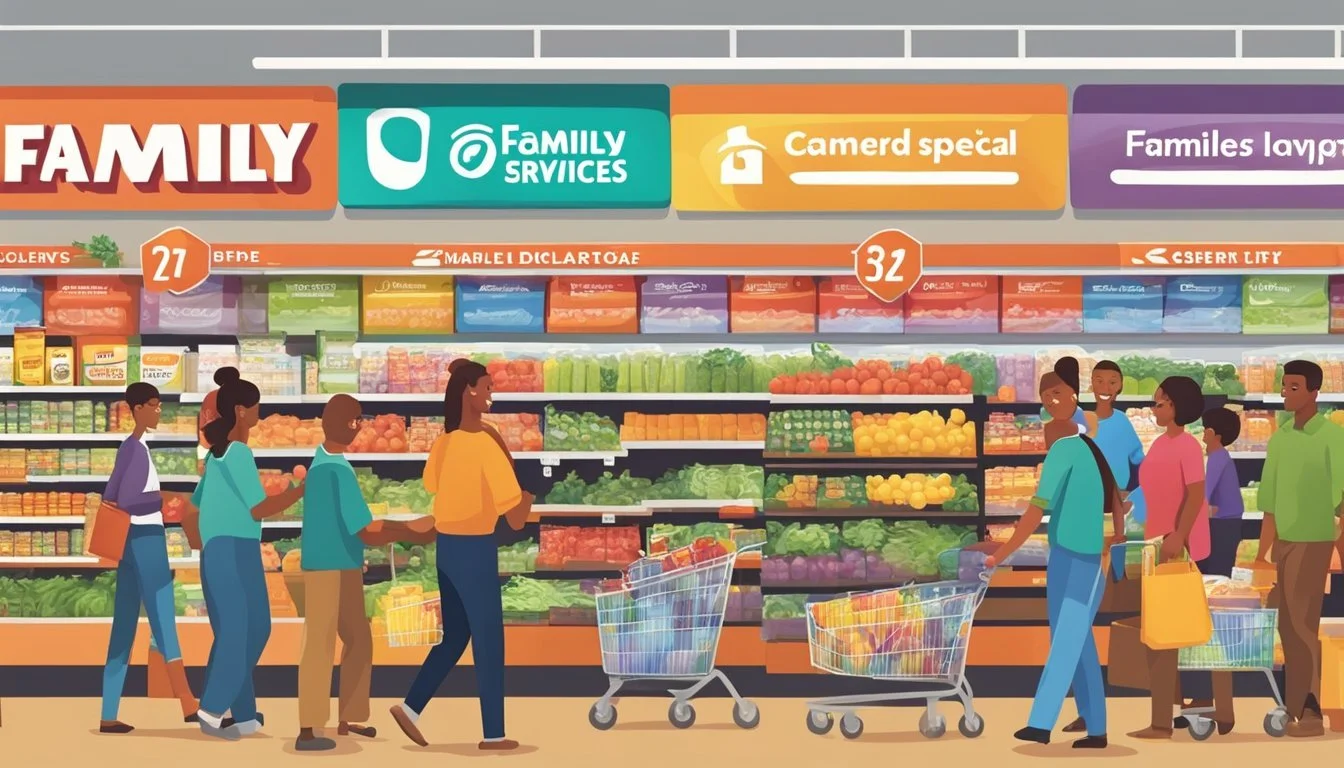Family Dollar vs Shoprite
A Comparative Analysis of Budget-Friendly Options
Family Dollar and ShopRite represent two distinct approaches to grocery shopping in the United States. While Family Dollar focuses on offering discount prices on a variety of household items and basic groceries, ShopRite positions itself as a full-service supermarket with a wider range of products and fresh food options.
ShopRite operates as a cooperative of independent retailers primarily in the northeastern United States. It has built a reputation for competitive pricing and quality products, especially in its produce and meat departments. On average, ShopRite tends to offer better overall value for a typical grocery shopping trip compared to Family Dollar.
Family Dollar, on the other hand, excels in providing affordable options for household essentials and non-perishable food items. While it may not offer the same breadth of fresh groceries as ShopRite, Family Dollar can be a convenient and budget-friendly option for quick purchases or specific household needs.
Company Backgrounds
Family Dollar and ShopRite are prominent retail chains with distinct histories and business models. Both companies have evolved over decades to become significant players in the grocery and discount retail sectors.
History of Family Dollar
Family Dollar began in 1959 when Leon Levine opened his first store in Charlotte, North Carolina. The company focused on providing affordable goods to working-class families. By the 1970s, Family Dollar had expanded to over 100 stores.
Throughout the 1980s and 1990s, the chain experienced rapid growth, reaching 1,500 locations by 1992. The company went public in 1970, enabling further expansion.
Family Dollar faced challenges in the 2000s due to increased competition. In 2015, Dollar Tree acquired Family Dollar for $8.5 billion, creating one of the largest discount retailers in North America.
History of ShopRite
ShopRite's roots trace back to 1946 when a group of independent grocers formed Wakefern Food Corporation. This cooperative aimed to increase purchasing power and compete with larger chains.
The first ShopRite-branded store opened in 1951. Throughout the 1950s and 1960s, ShopRite expanded its presence across the northeastern United States.
In the 1970s, ShopRite introduced its own private label products, enhancing its competitive edge. The chain continued to grow, focusing on customer service and community involvement.
Today, ShopRite operates over 300 stores across six states on the East Coast. It remains a cooperative, with individual store owners as members of Wakefern Food Corp.
Store Accessibility and Locations
Family Dollar and ShopRite have distinct geographic footprints, offering different levels of accessibility to customers across regions. Their store locations play a crucial role in determining convenience and shopping options for consumers.
Geographic Presence of Family Dollar
Family Dollar boasts a widespread presence across the United States, with thousands of stores in urban, suburban, and rural areas. The chain focuses on serving communities in all 50 states, particularly in regions with lower population densities. Family Dollar stores are often found in smaller towns and neighborhoods, providing convenient access to everyday essentials.
In the Northeast, Family Dollar maintains a strong presence. The chain has numerous locations in New York, New Jersey, and Connecticut, catering to diverse communities. Family Dollar's strategy involves placing stores in areas where larger supermarkets may be less common, filling a vital niche for local shoppers.
Geographic Presence of ShopRite
ShopRite concentrates its operations primarily in the Northeast, with a strong focus on New Jersey, New York, Connecticut, and parts of Pennsylvania. The chain has cultivated a loyal customer base in these regions over decades. ShopRite stores are typically larger format supermarkets, often found in suburban areas and shopping centers.
In New Jersey, ShopRite is particularly dominant, with stores spread across the state. New York also hosts numerous ShopRite locations, especially in the southern part of the state and Long Island. Connecticut features several ShopRite stores, primarily in the western and central regions.
ShopRite's strategy involves maintaining a dense network of stores in its core markets, ensuring customers have a ShopRite option within reasonable driving distance in many Northeastern communities.
Product Range and Availability
Family Dollar and ShopRite offer distinct product selections to cater to different consumer needs. Each store has its own strengths in terms of variety and availability of goods.
Variety of Goods at Family Dollar
Family Dollar focuses on providing everyday essentials at affordable prices. Their product range includes household items, cleaning supplies, and personal care products. The store also offers a limited selection of groceries, including snacks, frozen foods, and dry goods.
Family Dollar's food offerings typically consist of non-perishable items and a small frozen section. Customers can find basic pantry staples, canned goods, and packaged snacks. The store carries some name-brand products alongside its own private label items.
While Family Dollar may not have a full grocery selection, it provides convenience for quick shopping trips. The store aims to stock frequently purchased items that households need regularly.
Variety of Goods at ShopRite
ShopRite offers a comprehensive grocery shopping experience with a wide range of products. The store features extensive fresh produce departments, full-service delis, and bakeries. Shoppers can find a diverse selection of fruits, vegetables, meats, and dairy products.
ShopRite's product variety extends to both national brands and its own store-brand items. The store often carries specialty and gourmet foods alongside everyday staples. Customers can explore different international food sections and organic options.
The frozen food aisles at ShopRite offer numerous choices, from quick meals to premium ice creams. ShopRite also maintains well-stocked dry goods sections with pasta, grains, and baking supplies.
Many ShopRite locations include additional departments such as floral shops and pharmacies, further expanding their product range.
Price Comparison
Family Dollar and Shoprite offer distinct pricing strategies for grocery shoppers. Each store aims to provide value, but their approaches differ in significant ways.
Affordability of Family Dollar
Family Dollar positions itself as a discount store, focusing on low prices across a range of household goods and groceries. Their strategy revolves around offering everyday essentials at affordable prices. Family Dollar frequently runs sales and promotions to attract budget-conscious shoppers.
Many items are priced at $1 or less, making it an attractive option for those looking to stretch their grocery budget. However, the selection may be more limited compared to traditional supermarkets. Family Dollar's pricing model often includes smaller package sizes, which can result in a lower upfront cost but potentially higher price per unit.
Prices at Shoprite
Shoprite is known for competitive pricing in the supermarket sector. They offer a wider range of products than Family Dollar, including fresh produce, meats, and name-brand items. Shoprite's pricing strategy includes weekly sales, digital coupons, and a loyalty program for additional savings.
While not always the cheapest option, Shoprite often provides better value when considering product quality and variety. They frequently run "Can Can Sales" and other promotions that offer significant discounts on popular items. Shoprite's larger stores allow for bulk purchases, which can lead to savings for families buying in quantity.
Shoprite's prices on staple items are generally competitive with other major supermarkets. Their store-brand products offer additional savings opportunities without sacrificing quality.
Quality of Products
Product quality varies significantly between Family Dollar and ShopRite. These differences impact customer satisfaction and value for money.
Product Quality at Family Dollar
Family Dollar focuses on low-cost items, which can affect product quality. Their store brand items are generally cheaper alternatives to name brands. The store offers a limited selection of fresh produce, often pre-packaged.
Family Dollar's food products tend to be processed and shelf-stable. Fresh food options are minimal. The quality of non-food items like household goods and personal care products is typically lower than premium brands.
Customers shopping at Family Dollar should not expect high-end or natural and organic food options. The store prioritizes affordability over premium quality.
Product Quality at ShopRite
ShopRite generally offers higher quality products compared to Family Dollar. Their produce section features a wide variety of fresh fruits and vegetables. The store emphasizes quality in its fresh food departments.
ShopRite's store brand items often rival name brands in quality. They provide a range of natural and organic food options. The chain's commitment to quality extends to their meat, dairy, and bakery sections.
ShopRite stores typically maintain higher standards for product freshness. They offer a broader selection of premium and specialty items. Customers can find both budget-friendly options and higher-end products at ShopRite.
Store Brands and Exclusives
Family Dollar and ShopRite both offer exclusive store brands that provide value to customers. These private label products often compete with national brands on quality while offering lower prices.
Family Dollar Exclusive Brands
Family Dollar's primary store brand is Family Gourmet. This line includes a wide range of food products, from snacks to canned goods. Family Gourmet aims to provide affordable alternatives to popular name brands.
Family Dollar also offers Familia Latina, a brand focused on Hispanic food items. This line caters to the diverse needs of Family Dollar's customer base.
For household goods, Family Dollar features the Smart Living brand. This line includes cleaning supplies, kitchen tools, and home decor items at budget-friendly prices.
ShopRite Exclusive Brands
ShopRite's flagship store brand is Bowl & Basket. This line covers a broad spectrum of grocery items, including pantry staples, dairy, and frozen foods. Bowl & Basket products are designed to offer quality comparable to national brands at lower prices.
For natural and organic options, ShopRite offers the Wholesome Pantry brand. This line includes products free from artificial flavors, colors, and preservatives, catering to health-conscious consumers.
ShopRite's Paperbird brand covers household essentials like paper towels and cleaning supplies. These products aim to provide reliable quality at competitive prices.
ShopRite Home is the store's line of kitchen gadgets and home goods, offering affordable alternatives to more expensive housewares brands.
Special Services and Programs
Family Dollar and ShopRite offer distinct services and programs to enhance the shopping experience for their customers. These include various discounts, delivery options, and rewards systems tailored to each store's clientele.
Services at Family Dollar
Family Dollar provides a range of services to make shopping more convenient and affordable. The store offers digital coupons through its mobile app, allowing customers to save money on select items. Family Dollar also features a "Smart Coupons" program, which provides personalized deals based on shopping history.
For added convenience, many Family Dollar locations offer FedEx OnSite services. This allows customers to ship, pick up, or return packages while doing their regular shopping. Some stores also provide Western Union money transfer services.
Family Dollar's website features a "Smart Shopper" section with tips on maximizing savings and meal planning ideas. The company occasionally runs special promotions and seasonal sales events throughout the year.
Rewards and Programs at ShopRite
ShopRite's Price Plus club card is the cornerstone of its loyalty program. This free membership provides access to exclusive discounts and digital coupons. Customers can load these offers directly onto their card through the ShopRite mobile app or website.
The ShopRite from Home service allows customers to order groceries online for pickup or delivery. This service often includes special promotions and first-time user discounts.
ShopRite's dietitian program offers free nutrition counseling and wellness workshops at select locations. The store also provides a "Potluck" blog with recipes and cooking tips.
Digital Savings Center kiosks in ShopRite stores allow customers to print coupons and access personalized offers. The ShopRite Pharmacy program offers prescription discounts and free health screenings at participating locations.
Consumer Experience
Family Dollar and ShopRite offer distinct shopping experiences tailored to different customer needs. While Family Dollar focuses on budget-friendly options in a compact store format, ShopRite provides a full-service grocery experience with a wider range of products and services.
Shopping Experience at Family Dollar
Family Dollar stores are designed for quick and convenient shopping trips. The compact layout allows customers to easily navigate aisles and find essential items. Products are often displayed in bulk quantities, making it simple to stock up on household staples.
The store's focus on affordability is evident in its product selection, featuring many private-label and discount brands. Customers can find a mix of groceries, household goods, and personal care items at competitive prices.
Family Dollar's no-frills approach means fewer specialty departments compared to traditional supermarkets. This streamlined format can appeal to shoppers seeking efficiency and value in their grocery runs.
Customer Service at ShopRite
ShopRite places a strong emphasis on customer service, aiming to create a positive shopping experience. Well-staffed departments, including deli counters, bakeries, and produce sections, offer personalized assistance to customers.
The stores typically feature wider aisles and a more spacious layout, allowing for a comfortable shopping environment. ShopRite's loyalty program, Price Plus, provides members with exclusive discounts and personalized offers based on shopping habits.
Many ShopRite locations offer additional services such as pharmacies, florists, and prepared food sections. These amenities cater to customers looking for a one-stop shopping experience.
ShopRite's commitment to community involvement often translates to in-store events, local product offerings, and charitable initiatives, fostering a sense of connection with customers.
Market Presence and Competitors
Family Dollar and ShopRite operate in different segments of the retail market, each facing unique competitors and challenges. Their market presence varies significantly in terms of store count, geographic reach, and target demographics.
Family Dollar in the Retail Market
Family Dollar operates over 8,000 stores across 46 states, primarily targeting budget-conscious shoppers in urban and rural areas. Its main competitors include Dollar General and Dollar Tree, which acquired Family Dollar in 2015.
Family Dollar faces increasing competition from larger retailers like Walmart and Target, who have expanded their discount offerings. The chain has struggled to maintain market share against these giants and other dollar store competitors.
To compete, Family Dollar has focused on expanding its grocery selection and introducing more name-brand products. This strategy aims to position the chain as a convenient option for quick shopping trips.
Shoprite Among Grocery Chains
ShopRite operates over 300 stores in the northeastern United States, competing primarily with regional supermarket chains. Its cooperative structure allows individual store owners to tailor offerings to local preferences.
Key competitors include Stop & Shop, Wegmans, and Publix in certain markets. ShopRite also faces pressure from discount chains like Aldi and Lidl, as well as Walmart's grocery expansion.
ShopRite has maintained a strong market position through competitive pricing, a wide product selection, and a focus on fresh foods. The chain's loyalty program and digital initiatives have helped it compete against online grocery services from Amazon and others.
ShopRite's regional focus has allowed it to build strong brand recognition in its core markets, though this limits its national presence compared to larger chains like Kroger.
Online and Digital Shopping Trends
Digital grocery shopping has transformed how consumers purchase food and household items. Both Family Dollar and Shoprite have adapted to these evolving preferences, offering various online and mobile options to enhance convenience for their customers.
Family Dollar Digital Strategies
Family Dollar has embraced digital technology to improve the shopping experience. The retailer launched a mobile app that allows customers to browse products, access digital coupons, and create shopping lists. This app helps shoppers save money and time by planning their purchases in advance.
Family Dollar also partners with Instacart for same-day delivery in select areas. This service enables customers to order groceries and household essentials online and have them delivered to their doorstep within hours.
The company's website features weekly ads and special deals, making it easy for budget-conscious shoppers to find the best prices before visiting stores.
Shoprite's Online Presence
Shoprite has developed a robust online shopping platform. Customers can order groceries through the Shoprite website or mobile app for pickup or delivery. This service is particularly beneficial for busy families and individuals with limited mobility.
The retailer offers digital coupons that can be loaded directly onto customers' loyalty cards. These paperless savings are automatically applied at checkout, simplifying the savings process.
Shoprite's partnership with Instacart expands its delivery reach. Shoppers can access a wide range of Shoprite products through the Instacart app or website, often receiving their orders within hours.
The company's digital weekly circular helps customers plan their shopping trips and take advantage of current promotions. This feature is accessible via the Shoprite website and mobile app.
Final Verdict
Family Dollar and Shoprite offer distinct shopping experiences for consumers seeking groceries and household essentials. Each retailer has unique strengths and weaknesses in terms of product selection, pricing, and overall value.
Synopsis of Family Dollar
Family Dollar focuses on providing affordable options for budget-conscious shoppers. Their stores stock a mix of groceries, household items, and personal care products at competitive prices. The chain emphasizes convenience with numerous smaller-format locations in urban and rural areas.
Family Dollar's limited fresh produce and meat offerings may not suit all grocery needs. However, their frequent sales and discount programs can lead to significant savings. The stores' compact layouts allow for quick shopping trips, though product variety may be more limited compared to larger supermarkets.
Analysis of Shoprite
Shoprite positions itself as a full-service grocery store with a wider range of products. Their larger stores offer extensive fresh produce, meats, bakery items, and deli selections. Shoprite's private label brands provide quality alternatives at lower price points.
The chain's loyalty program and digital coupons enhance savings opportunities for regular customers. Shoprite stores typically feature more spacious layouts and a greater variety of national brands. While prices may be higher on some items compared to discount chains, Shoprite often runs competitive promotions and sales events to attract value-seeking shoppers.













